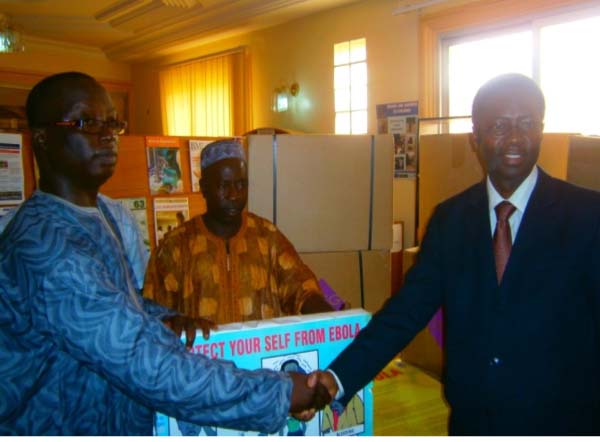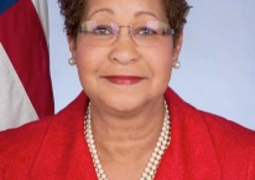
The United Nation System in The Gambia through the World Health Organization (WHO) Tuesday presented an assortment of medical items and other suppliers to the Ministry of Health and Social Welfare in Banjul in support of national Ebola preparedness and response efforts.
The item include more than 42 boxes with 400 sets of personal protective equipment, 2000 copies of posters on the prevention and control of EVD, 25000 copies of leaflets on EVD, 2000 copies of fact sheets on EVD, 2000 copies of EVD guidelines for health workers, and 200 copies of a handbook on Ebola and other haemorrhagic fevers.
In addition, the United Nations is providing detergents and other sanitary supplies for infection control, as well as strengthening public awareness and social mobilization through the media, and at the community level.
Speaking at the presentation ceremony held at the local WHO office, Dr Chales Sagoe-Moses, the WHO representative in The Gambia, expressed delight on behalf of the UN System to present the items to the Minister of Health.
He commended the Gambia government for its timely response to the Ebola situation in neighbouring countries, as manifested by the number of preparatory measures already put in place.
The purpose of Tuesday’s presentation ceremony was to further consolidate the UN’s support to the ongoing preparatory measures, he added.
The United Nations believes that an emergency of this nature poses far-reaching health, economic and social implications to individuals, families, the health system and the country at large, and that the country must be adequately prepared for this, Sagoe-Moses continued.
This was why the UN deemed it fit to respond as a single entity to these challenges, rather than intervening within individual domains, he further stated, adding that WHO was tasked to coordinate this effort.
The United Nations remains firmly committed to supporting The Gambia in all its efforts to prepare for the Ebola virus disease, he declared.
Health and Social Welfare minister Dr. Omar Sey described the donation as “very timely”.
He stressed the importance of close collaboration between the UN System and Health ministry, and thanked UN for their support to the government of The Gambia.
Meanwhile, in another development, UN WHO “is pleased to congratulate the government of The Gambia for being designated to serve on key decision-making bodies of the organisation in 2014 and beyond”.
This is contained in a press release dated 9 June 2014 and signed by Dr. Sagoe-Moses, which announced that “The Gambia joins WHO’s governing bodies”.
The release said these are the WHO Executive Board of the World Health Assembly and the Programme Sub-Committee of WHO Regional Committee for Africa.
“This is a well-deserved honour which demonstrates the commitment The Gambia attaches to fulfilling its obligations to the work of the WHO, as well as its determination to improve the health status of Gambians.”
According to the release, the WHO Executive Board comprises a team of 34 technically qualified personnel in the field of health, which is elected for a term of three years. Its main functions are: to give effect to the decisions and policies of the World Health Assembly; to advise it; and generally to facilitate its work.
The minister of Health, Dr. Omar Sey, will represent The Gambia at the board, from 2014 to 2017.
WHOAFRO’s programme sub-committee is a subsidiary and technical body, and comprises 16 representatives of member states.
Dr. Makie Taal the permanent secretary is The Gambia’s representative on this committee, which assists the regional committee by reviewing the budget, strategies, reports and proposed resolutions, and advises on policy and governance matters.



